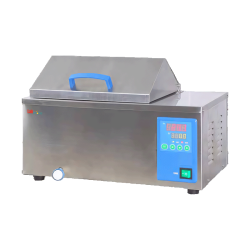
Stainless Steel Water Bath LMSL-A102 crafted with stainless steel insulated walls designed for incubating samples at a constant temperature and controlled environment for heating, or incubating biological samples. Our water bath accommodates a loading capacity of 30 L that incubate sample at 5 to 99 °C ensure safe and reliable operation. Outfitted with safety feature include automatic shut-off mechanisms to prevent over-heating and overloading.
Get Quote| Chamber volume | 30 L |
| Temperature Range | RT +5 ~ 99 ℃ |
| Temperature Stability | ±0.5 ℃ |
| Timing Range | 1 ~ 999 min |
| Display Resolution | 0.1 ℃ |
| Power Consumption | 1000 W |
| Voltage | 220 V; 50 Hz |
| Inner Dimension | 600 x 300 x 160 mm |
| External Dimension | 760 x 340 x 190 mm |
 Temperature range: RT +5 ~ 99 ℃
Temperature range: RT +5 ~ 99 ℃
 Microprocessor control with timing function
Microprocessor control with timing function
 Digital display for visual monitoring of parameters
Digital display for visual monitoring of parameters
 Over temperature alarm
Over temperature alarm
 Stainless steel chamber ensuring corrosion resistance
Stainless steel chamber ensuring corrosion resistance
It is widely used in research laboratories, for incubating reagents essential for molecular biology and tissue culture experiments.
Get Quote for
Stainless Steel Water Bath LMSL-A102
Related Products